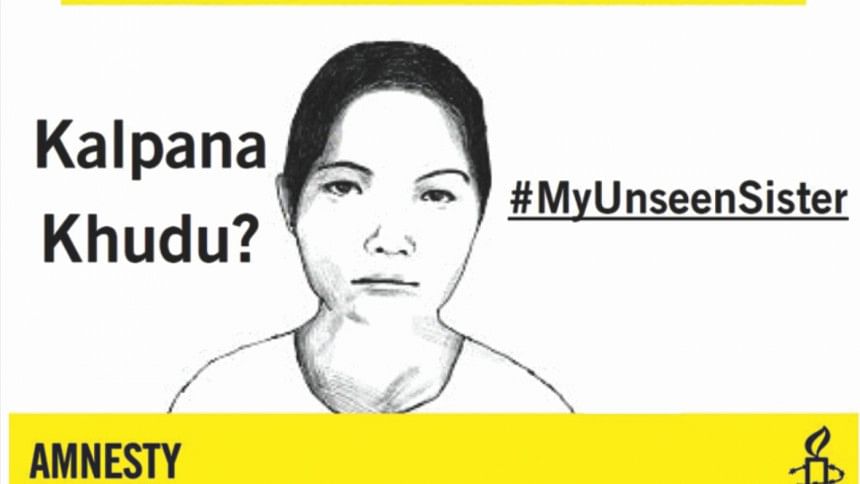Where is Kalpana?

An Amnesty International campaign poster with the sketch of a young woman appears on the screen when googled for #myunseensister. The question “Kalpana Khudu?” (Where is Kalpana?) glares beside the pictures.
On the poster, a statement written in Chakma language “20 Bozor Hazi Gelo -- Ezho Bichar No Ohlo” (20 years have been lost -- Still No Justice) tries to tell the young woman's story.
The sketch is of Kalpana Chakma, an indigenous community leader allegedly abducted by some members of security forces in the early hours of June 12, 1996, from her home in New Lalyaghona of Baghaichhari in Rangamati.
On the 20th anniversary of her disappearance -- after a judicial enquiry, two investigation reports by law enforcers and one progress report by Rangamati Police Superintendent -- “Kalpana Khudu?” is still unanswered.
Amnesty International, a human rights organisation founded in the UK, this year initiated a social media-based “Photo Action” on tumblr, asking people to take their pictures with the poster (available in Bangla, Chakma and English languages) and ask the Bangladeshi authorities about Kalpana's whereabouts.
The idea came up during an Amnesty International conference in Berlin around mid-May, said Bernhard Hertlein, speaker of the Bangladesh Coordination Group of Amnesty International Germany.
"... We will continue to ask for investigation and for justice -- and so do many people in Bangladesh too. This is the reason why Amnesty International started this photo action. We want to show with as many personal statements as possible, that Kalpana Chakma is not forgotten -- even after 20 years," he wrote to The Daily Star explaining the objective of the campaign.
Chris Chapman, indigenous rights researcher/adviser at Amnesty International said the campaign started on June 2 and new photos were being uploaded “constantly”.
"She was described as a symbol of resistance, and we wanted to create an action which is a way of resisting the failure to give Kalpana and her family justice," he emailed The Daily Star.
"We thought of a photo action because we heard from many Bengali activists that Bangladeshis outside the CHT know very little about the struggles people face there. That's why we have the posters in Chakma, Bengali and English languages," he explained.
People from Bangladesh, Germany, Denmark, Romania, the USA have posted their pictures with the poster at tumblr's myunseensister page. An Australian MP, a German policeman and an Egyptian activist has signed up for the campaign. A similar response was seen on Facebook and Twitter.
Joy Aselmann, a young woman from Darmstadt in Germany wrote on the photo she posted on tumblr: "When will the perpetrators of Kalpana Chakma be brought to justice?"
In fact, this question has plagued Kalpana's family and friends for the last 20 years.
The abduction took place a year before the signing of the CHT Peace Accord, a political agreement signed between the government and the Parbatya Chattagram Jana Sanghati Samity (United People's Party of the Chittagong Hill Tracts) in 1997 that ended decades-long struggle between the Shanti Bahini, an insurgent group, who fought for the rights of ethnic minorities, and the government forces.
Kalpana was the organising secretary of the Hill Women's Federation. She was campaigning for senior presidium member of the Pahari Gana Parishad Bijay Ketan Chakma, who was an independent candidate of 1996 national election, which took place only hours after Kalpana's abduction.
According to Kalpana's family and indigenous rights activists, she was vocal against the military presence in the Chittagong Hill Tracts (CHT) and supported CHT's autonomy-oriented movement Jana Sanghati Samity (JSS), and thus earned the chagrin of security forces.
After Kalpana's eldest brother Kalindi Kumar Chakma filed a case regarding her kidnapping with Baghaichhari Police Station on June 12, 1996, the government on September the same year formed a three-member judicial enquiry committee.
The committee interviewed 94 people including the alleged prime suspect Ferdous Kaiser Khan of Kojoichhari army camp in Rangamati. Two other suspects named by eyewitnesses were Village Defence Party (VDP) men Nurul Haq and Saleh Ahmed.
The probe committee report submitted to home ministry was never made public.
On May 21, 2010, police submitted the final report of the case without any conclusive remarks on Kalpana's abductors and whereabouts. Kalpana's brother rejected the report. A similar reinvestigation report was submitted by Criminal Investigation Department (CID) Chittagong Zone on September, 2012.
On January 16, 2013, the magistrate court of Rangamati handed over the case to the District Superintendent of Police (SP) of Rangamati for reinvestigation.
On July 20, 2014, SP Amena Begum submitted a progress report about the case and sought more time and since then the submission date of the admission report has been changed more than 20 times.
Amena left Rangamati in 2015 and the case is now being handled by her successor SP Sayeed Tarikul Hassan.
SP Hassan told The Daily Star that they were carrying out investigation as per the directive of the court.
He said the investigation of the case, which is very old, would take longer to complete and it might not be possible to complete and submit the report by the next report submission date, on July 12, fixed by a court.
Omar Waraich, media manager, Asia, Amnesty International, told The Daily Star last night that Aura Freeman, Amnesty International's campaigner for Bangladesh, Nepal and the Maldives, was engaged in the http://myunseensister.tumblr.com campaign.

 For all latest news, follow The Daily Star's Google News channel.
For all latest news, follow The Daily Star's Google News channel. 








Comments